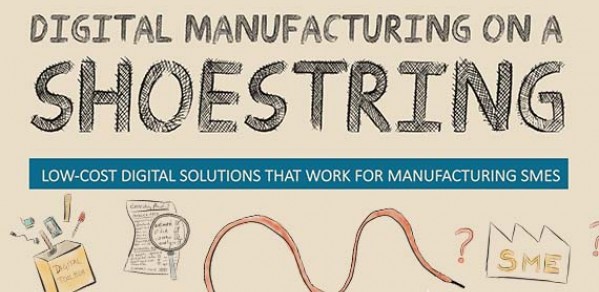
The University of Cambridge has been awarded £1.6 million grant funding to help support the translation of digital capabilities into the manufacturing sector.
This research is focussed on drastically reducing entry barriers for adopting automation systems - especially with small manufacturers in mind. We will exploit the fact that automation is developing at a faster rate outside industry than within it - so that off the shelf devices and equipment from other domains can potentially provide a low cost avenue.
Professor Duncan McFarlane
The funding, awarded by the Engineering and Physical Sciences Research Council (EPSRC), will support the Digital Manufacturing on a Shoestring [Digital Shoestring] project which will be led by Duncan McFarlane, Professor in Industrial Information Engineering and also involves the University of Nottingham and a significant number of industrial organisations.
Working with a wide range of industrial partners, the project will address a common concern that recent developments in digital manufacturing are unlikely to be accessible by SMEs, owing to the associated capital cost of upgrading industrial computing and communication environments.
It proposes a radically different approach to the digital evolution of a manufacturing operation by focussing predominantly on non-industrial solutions to industrial automation and information challenges. It will seek to exploit very low-cost commercially available technologies for mobile computing, sensing and Artificial Intelligence (AI), and will tackle the challenges associated with integrating these safely and securely into a small scale manufacturing environment.
The investment marks the continuation of EPSRC’s longstanding commitment to foster inter and multi-disciplinary collaboration and support business innovation via digital transformation. It arose out of work conducted by the Connected Everything Network Plus, which was established to create a multi-disciplinary community focussed on industrial systems in the digital age.
Professor Duncan McFarlane said: "This research is focussed on drastically reducing entry barriers for adopting automation systems - especially with small manufacturers in mind. We will exploit the fact that automation is developing at a faster rate outside industry than within it - so that off the shelf devices and equipment from other domains can potentially provide a low cost avenue."
Professor Philip Nelson, EPSRC’s Executive Chair, said: “The adoption of advanced ICT techniques in manufacturing provides an enormous opportunity to improve growth and productivity within the UK.
“The effective implementation of these new technologies requires a multi-disciplinary approach and these projects will see academic researchers working with a large number of industrial partners to fully harness their potential, which could generate impact across many sectors.”
Embracing digital capabilities to transform industries across the UK economy was emphasised in the Government’s modern Industrial Strategy, with AI being one of the Grand Challenges in which the UK can lead the world in years to come. In the Artificial Intelligence Sector Deal publication, it was confirmed that AI has the potential to solve complex problems fast, and in so doing, free up time and raise productivity.

